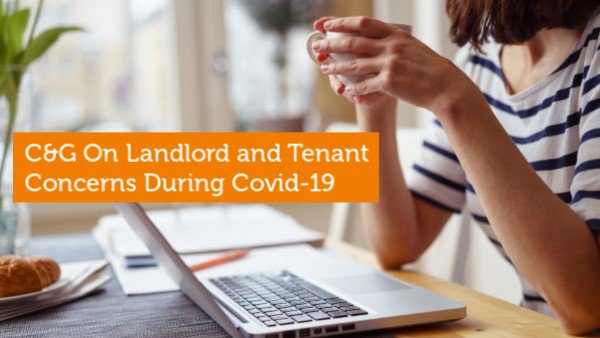C&G on Landlord and Tenant Concerns During COVID-19
The COVID-19 pandemic has impacted across our community at every level – the property market included. Tenants and landlords in particular have a symbiotic relationship – if a tenant is experiencing financial hardship, a landlord’s position will also be affected. It’s a difficult situation for everyone, and it’s important to acknowledge this difficulty. With regular communication and compassion, all parties can navigate this unusual time together and maintain a positive relationship. In this latest C&G blog, we highlight some of the financial assistance that may be available for individuals experiencing financial hardship. Depending on your situation, you may be eligible to draw upon monetary support to transition more smoothly through the pandemic.
For Tenants
Many tenants are facing financial insecurity due to the closure of non-essential businesses. The Government has since announced a 6-month moratorium on evictions to coincide with new legislation requesting Victorians stay home. It is important to remember the moratorium only extends to tenants experiencing financial hardship due to COVID-19. Normal consequences will apply to those breaching their lease agreement, and VCAT orders remain valid.
Tenants may apply for the Victorian Government Residential Rent Relief Package, which is an $80 million subsidy intended to cover up to $2000 of rental payments. Recipients will need to prove they are experiencing financial hardship caused by the pandemic and show that more than 30% of their income is dedicated to rent. They will also need to reach out to their property manager to organise alternative arrangements with their landlord such as rent reduction or temporary deferral.
It is also worth understanding the Victorian Government’s recent announcement regarding the COVID-19 Omnibus (Emergency Measures) Act 2020, which takes effect from 29th March until 29th September. Tenants on a fixed term tenancy can give a 14-day notice to vacate if they are affected by COVID-19 without incurring a lease break cost. If they break their lease agreement for reasons unrelated to COVID-19, the usual costs will still apply.
If you require more information, the REIV have been closely monitoring updates here.
For Landlords
Many landlords rely on their assets as a stable source of income. While the aforementioned rent relief package support tenants, it is paid directly to the landlord or estate agency looking after the asset. Prior to the package’s introduction, many landlords negotiated rent reductions or deferrals if they had good, long-term relationships with their tenants. These alternative arrangements could qualify them for land tax relief.
Those with landlord insurance should review their policies to see what they can and cannot claim. In relation to COVID-19 and tenants’ ability to pay rent, insurers will be responding in different ways. Landlords should also review their insurance conditions before offering alternative rental arrangements in case it voids their ability to claim.
Under the COVID-19 Omnibus (Emergency Measures) Act 2020, landlords handling rent arrears can undergo a mediation process or apply to VCAT for a termination order depending on the circumstances. Rent increases are also not allowed during this period, unless it is a reinstatement of the original amount following agreed rent reduction.
Do you have more questions? Do not hesitate to reach out to the friendly team at Chisholm and Gamon! This is an unusual time for us as well, and we’re doing our very best to ensure all our clients make it through this pandemic together.

